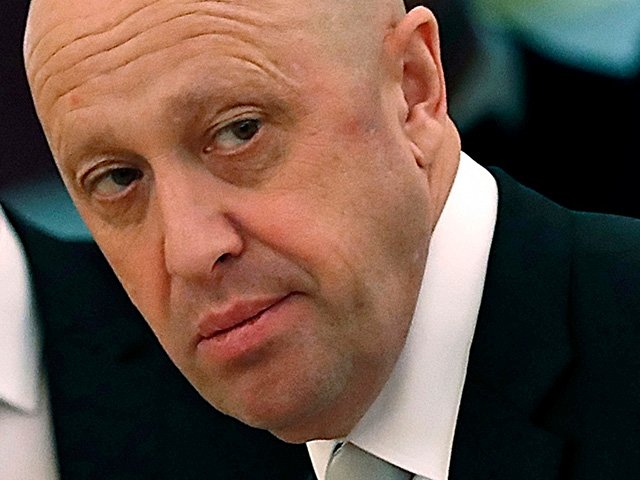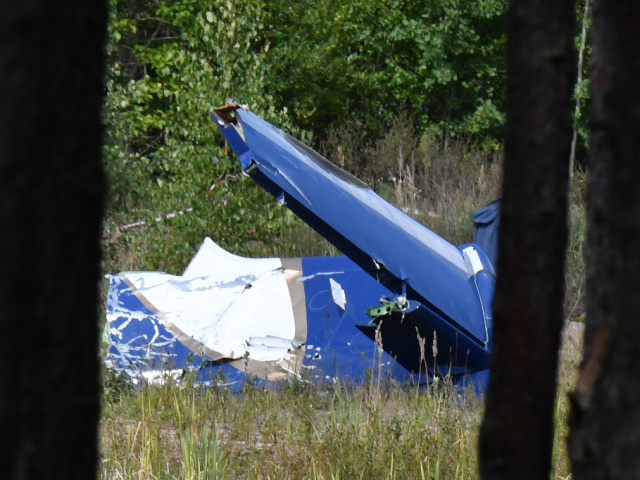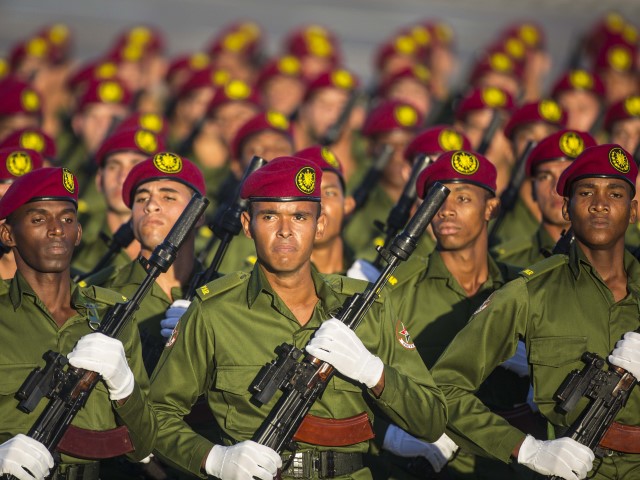Cuban diaspora media outlets, citing military and political experts, suggested this week that agreements between the communist Castro regime and its comrades in the government of Belarus could result in Cuban special forces taking on a significant role in Russia’s invasion of Ukraine.
The Spain-based news site Diario de Cuba, citing former Soviet intelligence official Yuri Borysovych Shvets, reported on Wednesday that Minsk’s announcement in May that it would train Cuban soldiers could indicate that those forces may cross the border into the Ukrainian war theater.
“Cuba plans to send its special forces to Belarus, where they could be used against Ukraine,” Shvets reportedly warned.
In Warsaw, Poland, on Tuesday, members of the Assembly for the Cuban Resistance held a press conference warning that the Castro regime stands to increase its leverage as a significant ally for Russia in the Ukrainian invasion. Among the evidence presented for Cuba’s participation in the Ukraine invasion and growing military influence in Eastern Europe was the announcement by a senior Belarusian official in May that the Castro regime would send troops to the country for military training.
The potential of a heightened Cuban regime presence in the Ukraine war increased this week as the Wagner Private Military Company (PMC), a Russian mercenary organization responsible for widespread atrocities in Ukraine, appeared to lose its top officials, including the head of the organization, Yevgeny Prigozhin. Russia’s aviation agency confirmed a plane crash on Wednesday killed ten people abroad a private plane flying north of Moscow. Prigozhin’s name was on the manifest, along with several other Wagner officials, but the Russian government said on Friday that it refused to confirm his death until the completion of DNA analysis on the corpses.

Russian businessman Yevgeny Prigozhin is shown prior to a meeting of Russian President Vladimir Putin and Chinese President Xi Jinping in the Kremlin in Moscow, Russia, on July 4, 2017. A business jet en route from Moscow to St. Petersburg crashed Wednesday, Aug. 23, 2023, killing all ten people on board, Russian emergency officials said. Mercenary chief Yevgeny Prigozhin was on the passenger list, officials said, but it wasn’t immediately clear if he was on board (Sergei Ilnitsky/Pool via AP, File).
The crash occurred exactly two months after Prigozhin took his troops out of Ukraine and attempted a mutiny against Russian leader Vladimir Putin, marching thousands of soldiers towards Moscow for one night and capturing the city of Rostov-on-Don before the Belarusian government intervened. Communist Belarusian dictator Alexander Lukashenko brokered a deal in which the Russian government dropped charges of staging an “armed uprising” against Prigozhin in exchange for him withdrawing his troops to Belarus, where they would undergo training.

The wreckage of a plane is seen at the crash site near the village of Kuzhenkino, Tver region, on August 24, 2023. Russian state-run news agencies on August 23, 2023 said that Yevgeny Prigozhin, the head of the Wagner group that led a mutiny against Russia’s army in June, was on the list of passengers of a plane that crashed near the village of Kuzhenkino in the Tver region (OLGA MALTSEVA/AFP via Getty Images).
As of this week, a large tent camp believed to house Wagner mercenaries in Belarus was mostly dismantled, according to Radio Free Europe/Radio Liberty (RFE/RL). While satellite images showed the tents had disappeared, the military equipment remained, leaving unclear who would operate it and to what end.
Wagner maintains a large presence throughout Africa, particularly in the Sahel region, where pro-Russian coups have swept at least four countries recently. Reports indicate Wagner fighters have not returned to Ukraine, however, leaving poorly trained Russian conscripts to lead the charge.
Shvets’s warning that Belarus was planning to send Cubans to fight in Ukraine preceded the plane crash that potentially killed Prigozhin. He made his claim based on high-level military exchanges between Minsk and Havana in the spring. On May 18, Valery Revenka, an aide to the Belarusian defense minister, posted a message on Twitter claiming that Cuban soldiers were on their way to Belarus for training.

Soldiers parade through Revolution Square in honor of late Cuban leader Fidel Castro in Havana, Cuba, Monday, Jan. 2, 2017 (AP Photo/Desmond Boylan).
“The meeting was held with Col. Mónica Gómez, a military [representative] of the Republic of Cuba,” Revenka wrote. “Main attention was dedicated to the training of Cuban military personnel in the Republic of Belarus and fostering of military cooperation between the two countries in a planned way”:
Se sostuvo el encuentro con la agregada militar de la República de Cuba, Col Mónica Gómez. La atención principal se dedicó al entrenamiento del personal militar cubano en la República de Bielorrusia y fomento de la cooperación militar entre los dos países de forma planificada pic.twitter.com/rrOlNzeQNe
— Валерий Ревенко (@Revenka_Valery) May 18, 2023
In June, Cuban Gen. Álvaro López Miera, the Minister of the Revolutionary Armed Forces of Cuba, visited Minsk for meetings with senior government officials on a tour that included stops in Russia and communist Vietnam. In those meetings, according to Belarusian media, the two sides “exchanged points of views over the evaluation of the security situation in the world and the political-military situation in the European region.” No reports on either side elaborated on the specifics of those discussions.
Russian Defense Minister Sergei Shoigu had issued a vote of confidence for Cuba’s loyalty to the Russian cause of invading Ukraine shortly after that meeting, according to Diario de Cuba, which quoted Shoigu as saying that the “Cuban friends … demonstrated a total understanding of the causes of the initiation of the special military operation in Ukraine.”
On Thursday, the Russian government allowed Cuba to restructure a long-ignored debt Cuba owed the country for payments towards the construction of an electrical facility that Russia never finished building. According to the independent outlet Cubanet, Cuba missed the February 2022 deadline to pay back the loan meant for the project, giving the Communist Party until June 2025 to make its payments.
Cuba and Belarus have maintained close in-person communication since the meeting in June. On Friday, the Belarusian media outlet BelTA reported that Belarusian Foreign Minister Sergei Aleinik used the opportunity of participating in the BRICS summit in South Africa to meet with Cuban External Affairs Minister Bruno Rodríguez, also attending alongside figurehead “President” Miguel Díaz-Canel. BelTA did not offer any details of the conversation, listing it as one among several exchanges with foreign diplomats at the event.
Prior to the negotiations between Minsk and Havana, reports in Cuban diaspora media in March indicated that at least 14 Cuban nationals were already fighting in Ukraine and were offered expedited residency in Russia for themselves and their families. The Cubans were part of a larger group of foreign nationals recruited to fight for Russia.
“They signed up, they are receiving money because they are contractors,” historian Álvaro Alba told Radio Martí at the time. “They receive a portion from the army, another portion is given to them by the local authorities who also have to fulfill a plan and they don’t care if they are Indians, Cubans, Mozambicans or Laotians.”
“They sign up and the short-term benefits are for their families there in Russia, this money they are going to be given and, also, with the possibility that in a few months they will receive Russian nationality,” he added.


